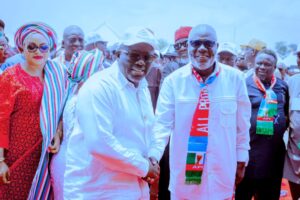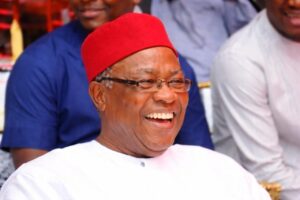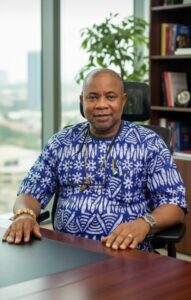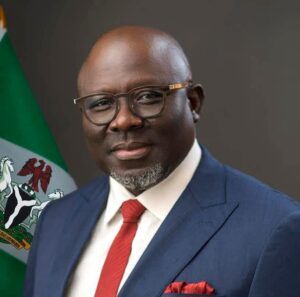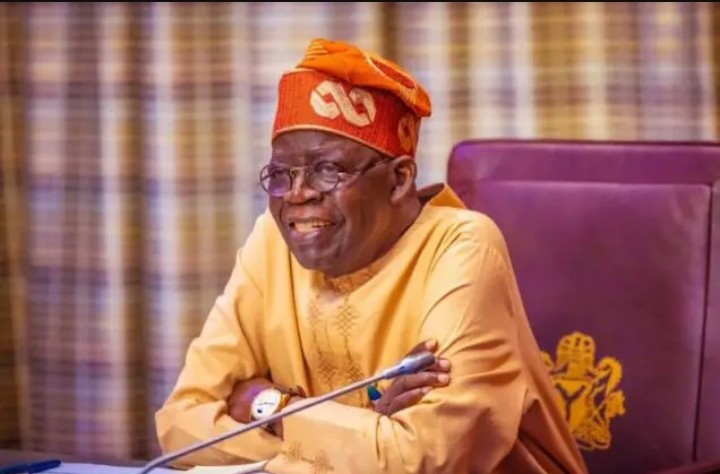
President Bola Tinubu
By Jon Egie
President Bola Tinubu has suggested a nine-month transition back to democracy in neighbouring Niger similar to the programme his country underwent in the late 1990s.
[the_ad id=”16914″]
Tinubu, who is also the chairman of ECOWAS, said Nigeria returned to civilian rule in 1999 after a nine-month transition programme instituted by former military head of state General Abdulsalami Abubakar.
Abubakar has headed delegations to meet the Niger junta to negotiate peace and restoration of democracy.
Tinubu said he saw no reason why Abubakar’s nine-month template cannot be replicated in Niger, if Niger’s military authorities are sincere.
[the_ad id=”16918″]
He gave the suggestion when he met with the Nigeria Supreme Council of Islamic Affairs, led by the Sultan of Sokoto, His Eminence, Muhammad Sa’ad Abubakar III, at the State House, Abuja.
Sultan Abubakar has also been involved in mediating the coup crisis in neighbouring Niger.
[the_ad id=”16917″]
“I must thank you for your several visits to Niger Republic, Your Eminence, but you will still have to go back”, Tinubu said.
“My fear has been confirmed in Gabon that copy cats will start doing the same thing until it is stopped. We are neighbours with Niger Republic, and what has joined Nigerians together with their great people cannot be broken.
“Nobody is interested in a war. We have seen the devastation in Ukraine and Sudan. But, if we don’t wield the big stick, we will all suffer the consequences together,” the President warned.
Tinubu said he sees no reason the Niger junta cannot follow General Abdulsalami Abubakar’s example.
“Your Eminence, please don’t get tired, you will still go back there. The soldiers’ action is unacceptable. The earlier they make positive adjustments, the quicker we will dial back the sanctions to alleviate the sufferings we are seeing in Niger,” the President affirmed.
[the_ad id=”16920″]
Algeria, Niger’s influential northern neighbour, has met with West Africa leaders in a bid to avoid any military intervention in Niger and has proposed a six-month transition.
The Economic Community of West African States imposed sanctions on Niger after troops ousted President Mohamed Bazoum in a coup on July 26 and the bloc threatened military intervention as a last resort if talks fail to restore civilian rule.
[the_ad_placement id=”advert-1″]
In a statement on Thursday, the bloc insisted it wanted Bazoum back in power right away.
“The military authorities in Niger must restore constitutional order immediately by liberating and reinstating… President Mohamed Bazoum,” it said.
But Niger’s new military leaders have dug in, saying they want a maximum three-year transition period to restore constitutional order and have ordered police to expel France’s envoy as tensions build with a key partner in Niger’s anti-jihadist fight.
Late on Thursday, Niger’s interior ministry announced it was stopping UN agencies, NGOs and international organisations from working in military “operation zones”.
It did not specify which regions were affected, but said the measures were “due to the current security situation”.
“All activities and or movements in the zones of operations are temporarily suspended,” it said.
[the_ad_placement id=”advert”]
The overthrow of Niger’s government has triggered concern around West Africa where Mali, Guinea and Burkina Faso have all been taken over by the military since 2020.
Fears of contagion have deepened with this week’s military rebellion in Gabon to overthrow President Ali Bongo, toppled moments after being declared winner of a highly disputed weekend election.
Credit: Dometsic Politics

